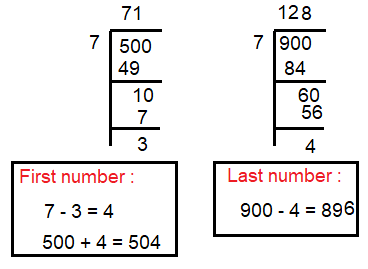HOW TO FIND MULTIPLES OF A NUMBER BETWEEN THE TWO NUMBERS
Subscribe to our ▶️ YouTube channel 🔴 for the latest videos, updates, and tips.
Problem 1 :
Find the sum of integers from 1 to 500 which are multiple of 2 or 5.
Solution :
The sum of integers from 1 to 500 which are multiple of 2 or 5.
= Sum of numbers multiple of 2 + Sum of numbers multiple of 5 - Sum of numbers multiples of both 2 and 5.
Number of terms which are multiple of 2 between 1 to 500 :
2, 4, 6, 8, ..............500
an = a + (n – 1)d
500 = 2 + (n – 1)2
500 - 2 = (n - 1)2
n - 1 = 498/2
n = 249 + 1
n = 250
Number of terms which are multiple of 5 between 1 to 500 :
5, 10, 15, ..............500
an = a + (n – 1)d
500 = 5 + (n – 1)5
500 - 5 = (n - 1)5
(n - 1) = 495/5
n = 99 + 1
n = 100
Number of terms which are multiple of 2 and multiple of 5 :
10, 20, 30, …, 500
an = a + (n – 1)d
let a = 10, d = 10, an = 500
500 = 10 + (n – 1)10
500 = 10 + 10n – 10
500 = 10n
n = 500/10
n = 50
Problem 2 :
Find how many two – digit numbers are divisible by 6.
Solution :
To find two – digit numbers are divisible by 6.
The two – digit numbers are divisible by 6 is 12, 18, 24, …, 96.
an = a + (n – 1)d
let a = 12, d = 6, an = 96
96 = 12 + (n – 1)6
96 = 12 + 6n – 6
96 = 6 + 6n
Subtracting 6 on both sides.
96 – 6 = 6 – 6 + 6n
90 = 6n
Dividing 6 on each sides.
90/6 = 6/6n
15 = n
Therefore, two – digit numbers are divisible by 6 is 15.
Problem 3 :
Find the sum of all multiples of 7 lying between 500 and 900.
Solution :
To find sum of all multiples of 7 lying between 500 and 900.

504, 511, 518, …, 896
First term a = 504
nth term = 896
d = b – a
d = 511 – 504
d = 7
an = a + (n – 1)d
let a = 504, d = 7, an = 896
896 = 504 + (n – 1)7
896 = 504 + 7n – 7
896 = 497 + 7n
399 = 7n
Dividing 7 on each sides.
399/7 = 7/7n
57 = n
Problem 4 :
Find the sum of first 40 positive integers divisible by 6.
Solution :
The first 40 positive integers divisible by 6 are 6, 12, 18, 24, ….
First term a = 6
d = 12 – 6 ==> 6
n =
40
Sn = (n/2) [2a + (n – 1)d]
S40 = (40/2)[2(6) + (40 – 1)6]
= 20[12 + 39 × 6]
= 20[12 + 234]
=
4920
Subscribe to our ▶️ YouTube channel 🔴 for the latest videos, updates, and tips.
Recent Articles
-
Finding Range of Values Inequality Problems
May 21, 24 08:51 PM
Finding Range of Values Inequality Problems -
Solving Two Step Inequality Word Problems
May 21, 24 08:51 AM
Solving Two Step Inequality Word Problems -
Exponential Function Context and Data Modeling
May 20, 24 10:45 PM
Exponential Function Context and Data Modeling